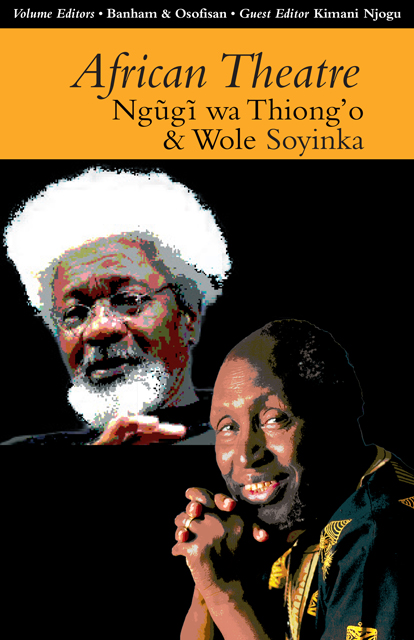Book contents
- Frontmatter
- Contents
- Notes on Contributors
- Obituary of Pat Amadu Maddy
- Introduction
- Reading & Performing African Drama: How Wole Soyinka & Ngũgĩ wa Thiong’o influenced my work
- Ayan Contra Ujamaa: Soyinka & Ngũgĩ as theatre theorists
- Encounters with Soyinka
- Encounters with Ngugi
- Wole Soyinka & Ngũgĩ wa Thiong’o: Plays in Production
- The Making of The Trial of Dedan Kĩmathi by Ngũgĩ wa Thiong’o & Mĩcere Gĩthae Mũgo at the University of California, Irvine: A personal reflection
- Playscript: A Rain of Stones
- Book Reviews
I - Working with Wole Soyinka
Published online by Cambridge University Press: 23 February 2023
- Frontmatter
- Contents
- Notes on Contributors
- Obituary of Pat Amadu Maddy
- Introduction
- Reading & Performing African Drama: How Wole Soyinka & Ngũgĩ wa Thiong’o influenced my work
- Ayan Contra Ujamaa: Soyinka & Ngũgĩ as theatre theorists
- Encounters with Soyinka
- Encounters with Ngugi
- Wole Soyinka & Ngũgĩ wa Thiong’o: Plays in Production
- The Making of The Trial of Dedan Kĩmathi by Ngũgĩ wa Thiong’o & Mĩcere Gĩthae Mũgo at the University of California, Irvine: A personal reflection
- Playscript: A Rain of Stones
- Book Reviews
Summary
Tunji Oyelana spoke to Sola Adeyemi at Emukay Restaurant, Camberwell, London, in April 2014. Oyelana is a long-time collaborator and was a member of Wole Soyinka’s groups in the 1960s. In this interview, he reminisces about the early days of Orisun Theatre and his roles in the company up to the start of the Nigerian civil war in 1967.
First encounter with Wole Soyinka
My story with ‘Prof.’ (Wole Soyinka) started in 1960. I was the Private Secretary to Chief Kosoko of Lagos and was also managing his elementary school, Oba Kosoko School, which was situated on the ground floor of [the] palace. I was the headmaster and a teacher, and I was also taking care of the Chief’s correspondence and organizing his administration. I spent about seven months working for Chief Kosoko, and suddenly, one day, the phone rang and the voice at the other end said he was Wole Soyinka. Now, I had heard about the man; the topic of my comprehension examination in the Cambridge School Certificate was Wole Soyinka. That was how I got to know about anybody called Wole Soyinka at that time; I had never heard of him before my examinations. But I had known his entire family, although I didn’t connect him with the family. Even when I started working with him, I didn’t relate him with the Soyinka family that I knew in Abeokuta. The father, Essay, (Samuel Ayodele Soyinka) was the Headmaster of St Peter’s School, Ake, Abeokuta. His mother (Mrs Grace Eniola Soyinka) was a very generous woman and had a lot of attributes that Soyinka inherited – Mama’s sense of humour was huge! She was very cheerful, very easy to talk to, and many people don’t know that Soyinka is also very approachable. So, I knew the father, I knew the mother, I knew the senior sister – Sister Tinu – who was at the Abeokuta Grammar School when I was at St John’s elementary school, Igbein, Abeokuta, because our house was right opposite the grammar school and she used to come to our house every school [day], and even on some Saturdays. Next door to our house was another bungalow where one woman sold food and the grammar school students used to eat in the tent in front of the woman’s house.
- Type
- Chapter
- Information
- African Theatre 13Ngugi wa Thiong'o and Wole Soyinka, pp. 17 - 23Publisher: Boydell & BrewerPrint publication year: 2014



